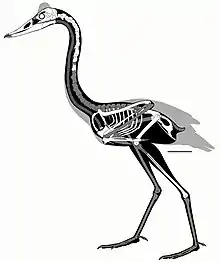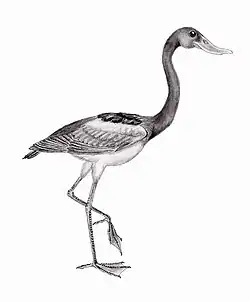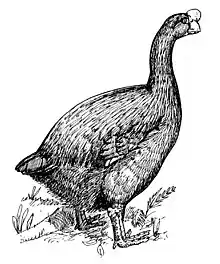Conflicto antarcticus
Conflicto antarcticus is a species of stem waterfowl whose fossils were found in the early Paleocene López de Bertodano Formation of Antarctica, the only species of its genus and the family Conflictonidae. It is characterized by it slender body and long legs, yet possesses a duck-like bill which indicates the form of beak evolved early in Anseriformes.[1]
| Conflicto antarcticus Temporal range: Early Paleocene | |
|---|---|
 | |
| Tambussi et al. skeletal reconstruction of Conflicto antarcticus | |
| Scientific classification | |
| Domain: | Eukaryota |
| Kingdom: | Animalia |
| Phylum: | Chordata |
| Clade: | Dinosauria |
| Class: | Aves |
| Order: | Anseriformes |
| Genus: | †Conflicto Claudia P. Tambussi et al. 2019 |
| Species: | †C. antarcticus |
| Binomial name | |
| †Conflicto antarcticus Claudia P. Tambussi et al. 2019 | |
Description
Conflicto is known from a single partially complete specimen described in January 2019. It had long legs compared to its body, contrasting what is seen in modern ducks. It is estimated to be around 36 centimetres (14 in) in length, and had a long head relative to body size. Its beak had a similar structure to that of ducks and geese, but was not as wide. The rostrum possessed narial openings wider than that of modern Anseriformes. Its neck was about half its body length, possessing (estimated) 15 long vertebrae.[1]
Classification
Conflicto was a likely a stem anseriform, equally related to the current extant clades. The genus Anatalavis is hypothesized to be less related to the magpie goose as previously thought, but placed as a sister clade to Conflicto, though this isn't conclusive. The phylogenetic classification remains uncertain, but is more likely to be stem-waterfowl rather than crown-waterfowl, separated from modern anseriform lineages.[1]
References
- Tambussi, Claudia P.; Degrange, Federico J.; De Mendoza, Ricardo S.; Sferco, Emilia; Santillana, Sergrio (2019). "A stem anseriform from the early Palaeocene of Antarctica provides new key evidence in the early evolution of waterfowl". Zoological Journal of the Linnean Society. 186 (3): 673–700. doi:10.1093/zoolinnean/zly085.


